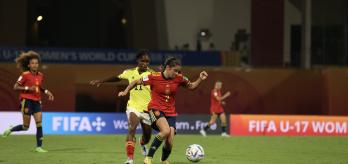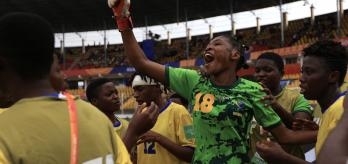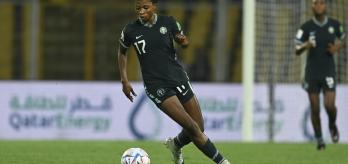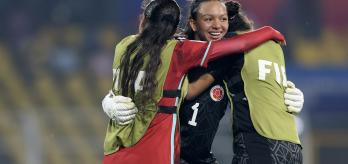Our Technical Study Group (TSG) has attended and observed every match in the tournament, from Bhubaneswar to Goa and Navi Mumbai, and will return to the DY Patil Stadium where the medal matches will be decided.
The technical observations are being explored with the support of the empirical data collected by the FIFA Performance Analysis and Insights Team. The overall tournament findings will be published early in 2023, but here our TSG look at both teams in a technical preview of the final.
Spain
Having finished second in Group C (behind Colombia), Spain overcame two excellent teams on their journey to Sunday's final, beating Japan 2-1 in the quarter-final and Germany 1-0 in the semi-final. In both games, Spain scored very late goals to win those matches, coming from 1-0 down in the 87th minute against Japan and netting a 90th minute winner versus Germany.
The resilience and patience they have shown, added to their capacity to change their approach tactically and through personnel, has been recognised by technical expert Mónica Vergara.
"Spain are very interesting in their capacity to adapt their game plan based on what is needed. They can vary their approach and the players have shown impressive awareness by adjusting their decisions based on the scenarios they are facing. For example, they can build play and show patience before choosing how to progress the ball when facing a mid or low block but have demonstrated the capacity to recognise when space is available in behind the opposition's defensive line when being pressed high, and they will opt for longer passes," she explained.
"Their substitutions have also been game-changers when introduced by head coach, Kenio Gonzales, and they have had a big impact on the outcomes of the games. A great example of this was the last-minute goal scored by Lucia Corrales in the semi-final against Germany. They are a very connected team, always working together both in and out of possession. You can see how much they enjoy working hard for each other and in how they play in different moments of the game," added Vergara.
In possession
Spain are a creative team that love to build up play and have players with the capacity to evaluate and problem-solve in order to choose the best way to progress the ball. Their squad consists of players with high technical capabilities and on the pitch they are meticulous with their tactical organisation.
According to Vergara, "The Spain players know their roles in possession. They look to play and receive the ball between the lines. They want to break the lines of opposition structure and have players with the personality, ability, vision and mobility to do this."
"When they build up from the goalkeeper, their centre-backs will step in with the ball to break the first line of the opponent's defence and have forward players who will recognise where the space is to offer to receive between lines 2 and 3. This means they can disturb the opposition's block," she added.
Spain commit wide defenders to their attack and understand how to maintain numerical supremacy in their rest defence without being too conservative. To strike this balance, they always look to match the number of opposition attackers with defenders and position an additional defender in the rest defence to keep the advantage.
Because they don't confine all defenders to this defensive structure, Spain can commit more players to their attacks and maintain support from midfielders, which in turn facilitates the capacity to execute an aggressive counter-press high up the pitch if they lose the ball. They also have technical, creative forward players who like to engage opposition defenders in 1v1s.
Out of possession
When Spain do not have the ball, players know their roles. When transitioning to defend, they like to engage an aggressive counter-press and press high; this was demonstrated in their group stage match against Mexico.
According to Vergara, "Structurally Spain are very organised and have great game awareness but individually, they also have very good defenders. They have fast and clever players in their defensive line and their connection with their goalkeeper is evident. They know when to engage and press, and when to drop. They understand the game."
"What is also impressive is that every player is a defender when Spain lose the ball. Against Germany, the appetite and desire from the forward players to win the ball back in the final third when an attack broke down was hugely impressive," she added.
To win the game
According to Vergara, to win the final Spain need to keep playing the way they have throughout the competition.
"Spain will likely face a low block in this match and will need to be patient in their build-up. They can switch play patiently and then be aware of the spaces when they open up. They can recognise when it's on to go through, but they have players who can penetrate and break lines in the wide areas. They can make changes to stretch the game by going in behind and receiving in front. They can play in tight spaces, use their bodies well to be open when receiving. It will be exciting to see how they play in this final," she added.
Colombia
Colombia topped Group C on goal difference and face the only team to have beaten them in this tournament so far. The pair met in the opening group-stage game with Spain securing the three points courtesy of an 85th-minute winner.
Colombia have demonstrated a distinct and consistent playing style: rather than trying to dominate possession, the South American side opt to use their blistering pace, speed and creativity in counter-attacks from a well-organised and disciplined low block.
According to Tom Sermanni, "Colombia have been a surprise team in this tournament, and they are very good at what they do. They frustrate teams with their committed defensive structure and are lethal on the counter-attack. They have some outstanding forward players who can change the game in a second with their ability to produce a moment of magic, yet they do not take the same volume of risks in their build-up the way other teams do."
In possession
Colombia have demonstrated a preference to allow their opponent to have possession and to play from the counter-attack. They do not take huge risks when they have the ball and this approach is very evident in how they build-up from their goalkeeper.
They prefer to keep six players connected defensively in all moments of the game and entrust their front four players with the attacking duties, as Sermanni explains:
"They keep their two defensive midfielders connected to the back four, even in build-up. This means you rarely see their full-backs over-lapping or their centre-backs stepping in. Their attacking play relies on the creativity, mobility and combination play of their front four players, as well as the pace and dribbling ability of captain Linda Caicedo."
"Their front four can not only exploit space in behind the opponent's defensive line, but they can receive in front of it also and their attacking players will go 1v1. The other six players just stay connected to them [the front four] to support them but also to deal with any transitions to defend," he added.
Out of possession
When Colombia do not have the ball, they are content to allow their opponent to build-up in their own half without pressure. They adopt a deep, low block, which comprises of a definite '4+2' (back four and two defensive midfielders) and a connected front four players.
Sermanni explains, "They do not want to let opposition players in behind them. They do not want to give up that space and stay really connected and narrow. Their two holding midfielders are very disciplined in their role. Colombia will give the space in front of their block and in the wide areas but they want to avoid any penetration in the central channel close to their goal.
From their own goal-kicks, they will often play long, retreating into a low block on the edge of their penalty area. Their wide forwards drop in either side of their defensive midfielders to create a second line of four in front of their back four, leaving their centre-forward and most advanced attacking midfielder with the responsibility of pressing recycled passes but also positioning themselves in 1v1s with opponent defenders so they can be ready for fast counter-attacks.
"As soon as they win the ball back, their intention is to play the ball forward as quickly as possible and their forward players immediately commit to forward runs. They are extremely explosive and fast in these moments of the game. They want to hit opposition defences when they are open and vulnerable with their fast forward players who are technically excellent and direct when transitions to attack occur," he added.
To win the game
According to Sermanni, to win this match Colombia should continue to play to their strengths.
"Colombia have been very effective in their playing style and they should continue to play to their strengths because against Spain in the opening game of the tournament, they were effective for long spells. They need the creativity from their forward players but also defensively, their defenders will need to be very aware of the different challenges they will face against Spain's forward players in 1v1s to increase their chances of creating opportunities to counter-attack."
Key battles: Transitions
Moments of transition will be key for both teams in this game according to Anna Signeul:
"Spain and Colombia are extremely effective in how they counter-attack and both teams have extremely technical and fast forward players who can produce match-winning moments. Caicedo, Rodríguez, Muñoz, Orianna (Colombia) and López, Camacho, Amezaga (Spain) are all players that do not need a huge amount of space to produce moments of magic. The 1v1 duels between defenders and attackers, particularly in moments of transition will be crucial in this game," she explained.
"For both teams, the battle will be in the space in front of the opposition back-line and in the pockets of space either side of the defensive midfielders. Both sides want this space and have forward players who can exploit it. It will be fascinating to see how things unfold in this part of the pitch," she added.
To break down defensive blocks, attacking teams need to isolate defenders in 1v1s. Winning these duels creates numerical supremacy and will be key to the success of the team that wins this match.
The Goalkeepers
Both Spain and Colombia have goalkeepers that can make a huge impact on the outcome of this match. That's according to FIFA senior goalkeeping expert, Pascal Zuberbühler, who has been observing this tournament as part of the TSG. Here, he explains the standout attributes of the goalkeepers in this final.
Spain: Sofia Fuente
Fuente is a complete goalkeeper with good variety in her distribution and is in synch to her team during build-up play.
According to Zuberbühler, "She has many good attributes and dimensions to her game for such a young goalkeeper. It's impressive. She is always involved with her team in the build-up and moves to create angles so she can support the play and receive. She can play short, medium, and long passes with good accuracy and this is important for her team because she can recognise where the space is for her team to play in." (See clip 1 below)
In defensive moments, she has also been effective for her team due to maintaining high levels of concentration and awareness of dangerous situations.
"In crucial moments she is alert and brave for her team. She is a strong presence in her penalty area and her defenders can trust her to read when she needs to take control of important situations. She understands the distances she needs to maintain with her defensive line and when it is her responsibility to come for the ball," he added. (See clips 2 and 3)
Colombia: Luisa Agudelo
At just fifteen years of age, Luisa Agudelo has had a immense impact for team. Her crucial saves in the penalty shootout against Nigeria in the semi-final earned her the Player of the Match award.
Here, Pascal Zuberbühler explains what has impressed him in Colombia's goalkeeper:
"She has brilliant understanding of how her team plays and she ignites fast counter-attacks. When her team is in the low block and she claims the ball, she is connected to her forward players and can find them early. She knows where they will be and can execute long goal kicks from her hands to find them and release them quickly. This is impressive for such a young a goalkeeper," he explained. (See clips 1 and 2 below)
"In the semi-final against Nigeria, she didn't have a huge amount to do but she made a crucial save in the second half. Her good starting position and good footwork allowed her to make a big save against Nigeria. But in the penalty shootout, wow, the two saves she made were brilliant. For the first save, it looks like she gets a crucial fingertip to the ball and sends it onto the post. At full-stretch this is fantastic." (See clip 3)
"And then the crucial match-winning save when the penalties had gone to sudden death. She anticipated where the penalty would go and made a big save with great timing to send her team to the final. It was fantastic and a big moment for her team," concluded Zuberbühler. (See clip 4)
Spain and Colombia will contest the final at the DY Patil Stadium in Navi Mumbai on Sunday 30th October with an 8pm kick-off local time. That match is preceded by the bronze-medal contest between Germany and Nigeria at 4.30pm local time.























